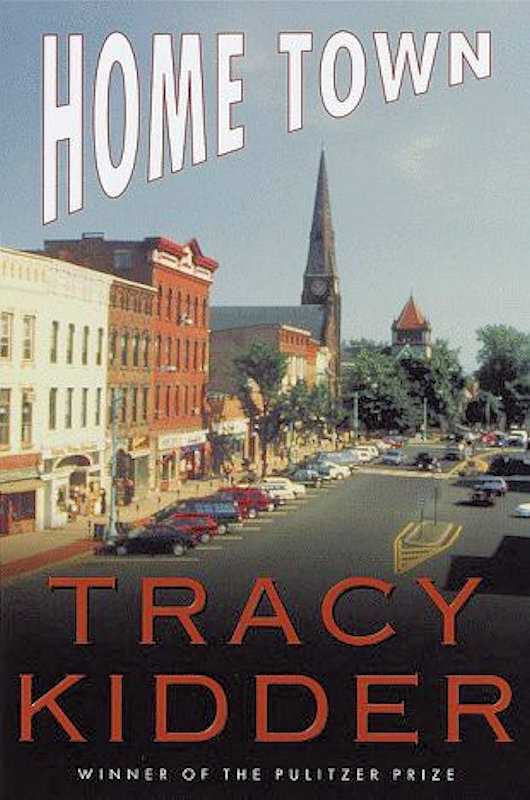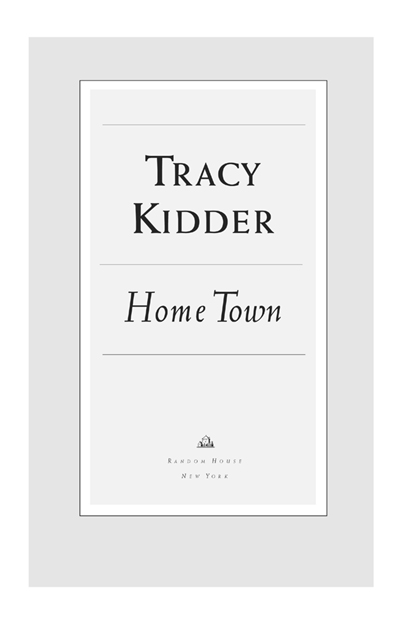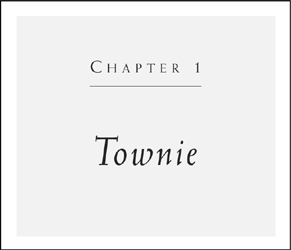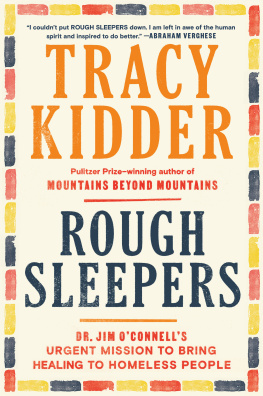Tracy Kidder - Home Town
Here you can read online Tracy Kidder - Home Town full text of the book (entire story) in english for free. Download pdf and epub, get meaning, cover and reviews about this ebook. year: 2000, publisher: Washington Square Press, genre: Detective and thriller. Description of the work, (preface) as well as reviews are available. Best literature library LitArk.com created for fans of good reading and offers a wide selection of genres:
Romance novel
Science fiction
Adventure
Detective
Science
History
Home and family
Prose
Art
Politics
Computer
Non-fiction
Religion
Business
Children
Humor
Choose a favorite category and find really read worthwhile books. Enjoy immersion in the world of imagination, feel the emotions of the characters or learn something new for yourself, make an fascinating discovery.

- Book:Home Town
- Author:
- Publisher:Washington Square Press
- Genre:
- Year:2000
- Rating:3 / 5
- Favourites:Add to favourites
- Your mark:
- 60
- 1
- 2
- 3
- 4
- 5
Home Town: summary, description and annotation
We offer to read an annotation, description, summary or preface (depends on what the author of the book "Home Town" wrote himself). If you haven't found the necessary information about the book — write in the comments, we will try to find it.
Home Town — read online for free the complete book (whole text) full work
Below is the text of the book, divided by pages. System saving the place of the last page read, allows you to conveniently read the book "Home Town" online for free, without having to search again every time where you left off. Put a bookmark, and you can go to the page where you finished reading at any time.
Font size:
Interval:
Bookmark:


Copyright 1999 by Tracy Kidder
All rights reserved under International and Pan-American Copyright Conventions. Published in the United States by Random House, Inc., New York, and simultaneously in Canada by Random House of Canada Limited, Toronto.
Random House and colophon are registered trademarks of Random House, Inc.
Grateful acknowledgment is made to Harcourt Brace & Company and Faber and Faber Limited for permission to reprint four lines from Little Gidding in Four Quartets by T. S. Eliot. Copyright 1942 by T. S. Eliot and copyright renewed 1970 by Esme Valerie Eliot.
Rights outside the United States are controlled by Faber and Faber Limited. Reprinted by permission of Harcourt Brace & Company and Faber and Faber Limited.
Grateful acknowledgment is made to Libby Roderick for permission to reprint excerpts from How Could Anyone, words and music by Libby Roderick. Libby Roderick Music 1988. From the recording If You See a Dream, Turtle Island Records, PO Box 203294, Anchorage,
Alaska 99520. (907) 2786817, ,
www.alaska.net/~libbyr/. Reprinted by permission.
Library of Congress Cataloging-in-Publication Data
Kidder, Tracy.
Home town / Tracy Kidder
p. cm.
eISBN: 978-0-307-82647-3
1. Northampton (Mass.)Biography. 2. Northampton (Mass.)Social conditions. 3. Northampton (Mass.)History. 4. Police officersMassachusettsNorthamptonBiography. 5. City and town lifeUnited StatesCase studies. I. Title.
F74.N86K53 1999
974.423dc21 99-13614
Random House website address: www.atrandom.com
v3.1
T his is a work of nonfiction. Most of the spoken words that appear in this book were uttered in my presence, some recounted to me. I have attributed thoughts to some of the characters, and all of these were plausibly described to me. All names are real, except as noted here. The following are pseudonyms: Carmen, Francisco/Frankie Sandoval (and Samson/Sammy Rodriguez), Hearth n Home Construction, Jackie, Rick Janacek, Willie, and Tyrone.
I describe a criminal proceeding and cite various documents relating to it. Some of those documents were part of official court proceedings, and the others were supplied to me by the defendant. I also refer to various criminal records, which I obtained in accordance with Massachusetts law.
I n the days of rutted roads and horse-drawn transportation, tourists by the thousands trekked to western Massachusetts and ascended to the summit of Mount Holyoke. Charles Dickens and Henry James made the climb. Thomas Cole and other, lesser nineteenth-century romantic painters set up their easels near the precipice. The scene they gazed at was, for a time, the most famous landscape in America. Now an interstate highway and a marina intrude on the view. Otherwise, it hasnt changed much. You look out on the valley of the Connecticut River, an expanse of cultivated fields and of forest sweeping away across the horizon, and, at the center, the old town of Northampton.
It nests within natural boundaries. To the east the wide river bends its arm around Northamptons Meadows, planted mostly in corn. To the north and west the foothills of the Berkshires rise up in the blue distance, higher than the towns steeples. When Cole painted his famous picture View from Mount Holyoke, Northampton, Massachusetts, After a Thunderstormit now hangs in New Yorks Metropolitan Museum of Artthe town was already more than 180 years old. It was nearly 200 when an entrepreneur, hoping to cash in on the view, erected the Mount Holyoke Prospect House. A cable car used to carry up the tourists. It vanished years ago. The hurricane of 1938 battered the hotel and closed it down for good. Only the shell remains. Standing on the old front porch on a windy summer day, at the edge of an eight-hundred-foot drop, you feel grateful for the railing. Down below, the river glistens in the August light. A small airplane wobbles like a gull as it descends toward Northamptons tiny airport in the Meadows. Sylvia Plath visited this promontory and in a poem described the sweet illusions of the view. Alls peace and discipline down there, she wrote. Surrounded by what she called the high hush, the only sound the wind in your ears, you gaze northwest at the town.
It seems as natural as the hills around it. Among the myriad trees, you can make out some of the roads and white houses and steeples and the back side of Main Streeta line of buildings, tiny from here, a patchwork of red and brown behind the greenery. Only thirty thousand people live in Northampton, roughly the same number as forty years ago, not many more than at the turn of the century. And it still preserves the old pattern of the New England township, a place with a full set of parts. It has rich farmland by the river, an industrial park, a hospital, a courthouse and registry (Northampton is a county seat), and a college (Smith, the famous school for women). A shopping strip follows the line of the railroad tracks and the Interstate, north toward Vermont, for a mile or so. Tree-lined streets of clapboarded houses from the last century surround the old downtown. In recent years, ranch-style houses have sprung up along outlying roads. Their backyards merge into forest where coyotes howl at night.
From the summit, the cornfields are a dream of perfect order, and the town seems entirely coherent, self-contained, a place where a person might live a whole life and consider it complete, a tiny civilization all its own. Forget the messiness of years and daysevery work of human artifice has a proper viewing distance. The town below fits in the palm of your hand. Shake it and it snows.


H e grew up here. He was the youngest of Jane and Bill OConnors seven children. His oldest sister called him Todder when he was an infant. His high school friends shortened up his surname and rechristened him Oakie. To teachers and other adults he was usually Tommy. His wife would call him Tom. All his nicknames and the diminutive accompanied him to adulthood. If you do all your growing up in the same small place, you dont shed identities. You accumulate them.
One day when he was ten years old, Tommy OConnors Little League baseball coach made him the starting pitcher. A signal honor, but then Tommy couldnt get anyone out. He walked the first batter, and from their lawn chairs on the sidelines the parents called, Make him be a hitter, Tommy. So he threw an easy one right over the plate, and the batter nailed it. His teammates in the field behind him did as theyd been taught: they talked it up, they chattered, squeaky voices calling, Hum chuck, Tommy. No batter, no batter. Hum it in there, Tommy baby. He threw harder and walked the next two batters. He eased up and the next kid hit it over everything. Many games of Little League reach this kind of impasse. Five runs in, the bases loaded once again, and still nobody out, the fielders grumbling, the parents looking on in silence, all except for one, someone elses father, who cares more about a good ball game than his neighbors son, and shouts, Get him outa there, for Christs sake! Tommy stood on the mound, staring at his shoes.
Font size:
Interval:
Bookmark:
Similar books «Home Town»
Look at similar books to Home Town. We have selected literature similar in name and meaning in the hope of providing readers with more options to find new, interesting, not yet read works.
Discussion, reviews of the book Home Town and just readers' own opinions. Leave your comments, write what you think about the work, its meaning or the main characters. Specify what exactly you liked and what you didn't like, and why you think so.







